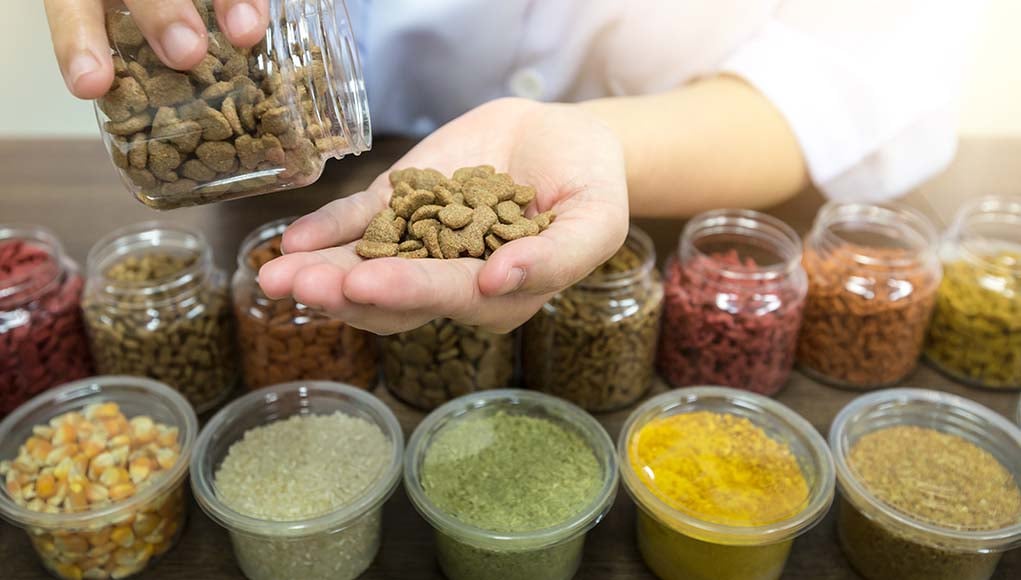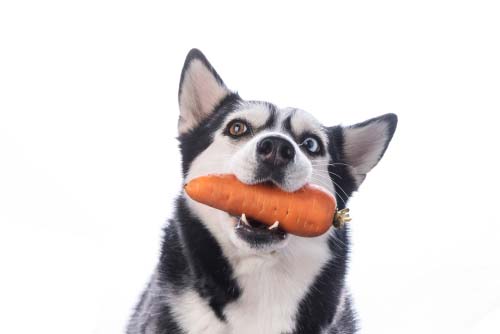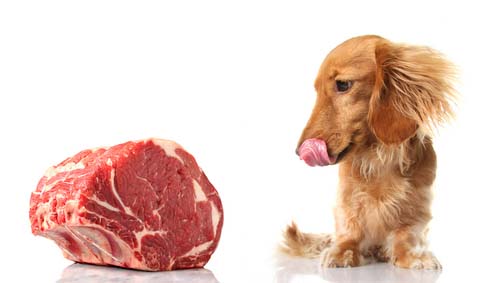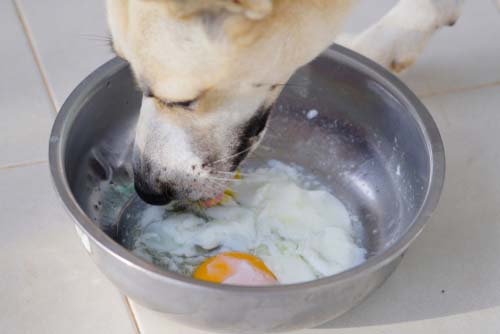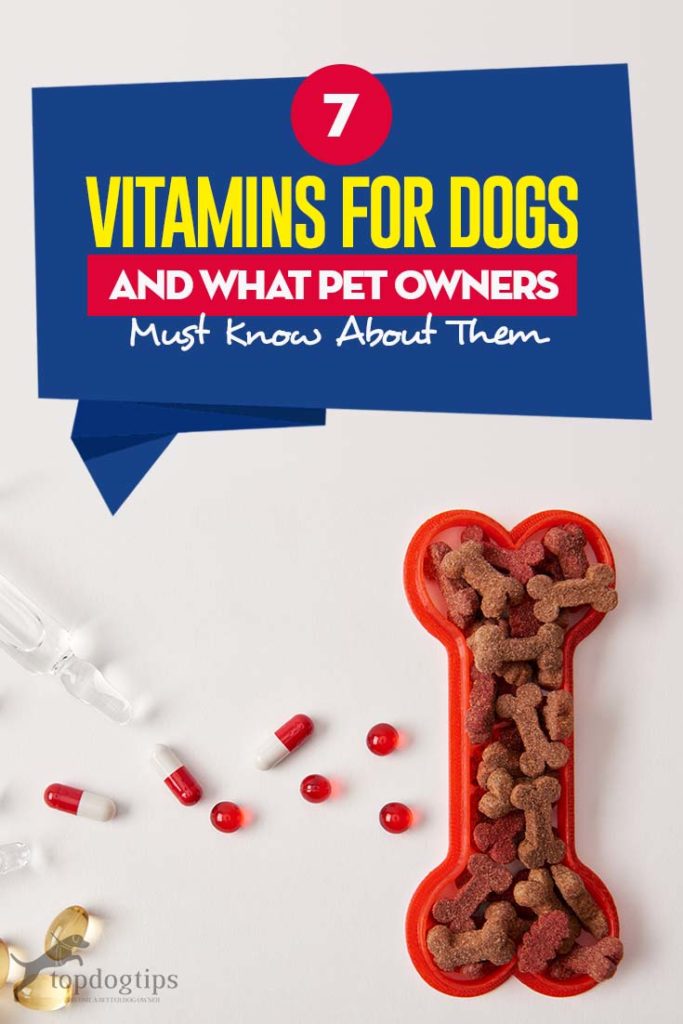Dogs, like humans, need vitamins in specific quantities for the proper functioning of their metabolism. Most often, a good quality dog food you're buying will already include the essential amount of vitamins for your dog. However, depending on health issues or diet requirements, the amount may need may have to be monitored and adjusted.
Vitamins are organic molecules, which contain carbon. They're are also defined as essential micro-nutrients and antioxidants. Dogs either cannot synthesize some of them at all, or they can but in insufficient amount. Therefore, vitamins are best absorbed from real food, which is why an appropriate diet is crucial.
There are two basic types of vitamins:
Water-soluble vitamins which cannot be stored in a dog's body and which should be consumed more often.
Fat-soluble vitamins which are stored in a dog's body and can last for months. Since the dog can store these, it is easier to maintain a certain level of them in their organism.
There are 13 vitamins known as important in a person's diet. However, the vitamins humans should pay attention to are not the same for your dog.
As an example, while we need to take vitamin C regularly because our body cannot synthesize it, our dogs can and, therefore, there is usually no need for additional dosage of Vitamin C for dogs.
7 Vitamins for Dogs You Should Know About
When your pet's diet isn't properly balanced, they're at risk of vitamin deficiency.
The issue is more common when feeding homemade diet as opposed to commercial foods, simply because it's harder to calculate all the essential nutrients when making your own food. There have been many reports of dogs becoming ill due to improperly balanced homemade meals, all of them associated with the lack of vitamins (1, 2, 3, 4, 5). Similar problems were observed in dogs fed a raw diet (6, 7).
Note: Similar to lack of vitamins in their diet, giving your pet too much of any vitamin can lead to an overdose and vitamin toxicity. Whatever you give your dog, always consult your vet about appropriate dosage and monitor the animal afterward.
1. Vitamin A
Vitamin A is a fat-soluble nutrient that boosts your dog’s immune system and it has an effect on muscles, fur, cell function, fetal development and nervous system. It's a group of three compounds: retinol, retinal and retinyl esters (8). Vitamin A being fat soluble means that it’s stored in a dog's body tissue and will be used as needed.
The lack of this vitamin in a dog's diet could be dangerous. National Animal Supplement Council points out that the first consequence of vitamin A deficiency in dogs is the sick appearance of your pet's fur and skin, and night blindness. Ultimately, this deficiency leads to muscle impairment and weakening of the body. This vitamin is particularly important to pregnant female dogs and puppies, because it supports the development of their muscle and nervous system.
Studies show that dogs can effectively utilize beta-carotene from food like carrots for their Vitamin A needs (9). The minimum required Vitamin A dosage is 5,000 IU per two pounds of food for both adult and puppies, with studies suggesting 100,000 IU per 1,000 kcal being the upper safety limit (10).
Foods with Vitamin A that are safe for dogs:
- Egg yolk
- Beef liver
- Chicken liver
- Butter
- Fish (trout and king mackerel)
- Vegetables (sweet potato, pumpkin, and carrots)
2. Vitamin B
Vitamin B is a complex/group of eight vitamins which are useful for different purposes. Some of its most important benefits include improving the operations of the dog's nervous and blood cell system, improving energy regulation and metabolism, boosting the immune system and contributing to the hormonal balance.
Vitamin B complex is water-soluble, which means that they cannot be synthesized and stored in a dog's body, and they have to be taken regularly (11, 12).
Deficiency of certain B complex vitamins is well-known and documented in dogs (13, 14, 15, 16). Because B complex contains a number of vitamins, there's a large number of health issues that may result from Vitamin B deficiency in dogs: increased stress level, shedding fur and rotten teeth, obesity, constipation, attracting insects such as fleas and ticks, anemia, a bad immune reaction to vaccination, and premature hair graying (17, 18, 19).
Foods with Vitamin B that are safe for dogs:
- Liver
- Heart
- Kidney
- Eggs
- Yeast
- Molasses
3. Vitamin C
Vitamin C (L-ascorbic acid and dehydro-L-ascorbic acid) is something you don't have to worry about. The reason for that is that your dog can synthesize this vitamin on their own, and they probably won’t need any additional amount from the food (20).
Vitamin C plays a role of an antioxidant that helps dogs with cognitive functions, dementia, brain activity, the immune system and improves body response to inflammation.
Additional supplementation with Vitamin C won't do much good for a dog (21). Only with very rare health conditions, injections of Vitamin C may be prescribed as a way to fight fatal health issues like melanoma in dogs (22).
4. Vitamin D
Vitamin D is responsible for retaining calcium, which is crucial for bone development in dogs, and as possible prevention to pancreatitis, among other health factors (23, 24, 25, 26, 27).
Unlike with people, where Vitamin D is known as “sunshine vitamin” because humans are able to synthesize it from UV rays, dogs cannot do that (28). Diet is the only way to get Vitamin D for dogs.
Foods with Vitamin D that are safe for dogs:
- Fish (mostly salmon and tuna)
- Dairy products
- Liver
- Egg yolks
Note: Be careful about the daily intake of Vitamin D for dogs. FDA warns that the side-effect of taking and retaining too much of this vitamin can be dangerous and lead to liver failure or even a fatal outcome. Many dog food brands have been recently recalled due to too high amount of Vitamin D.
5. Vitamin E
Vitamin E improves cell function and immune response in dogs, but it also helps the development of the muscle and nervous system and regulates the heart rate. Vitamin E is also responsible for making your dog’s coat look healthy and shiny, and preventing a variety of skin issues (29, 30, 31, 32).
Vitamin E treatment was also shown to improve semen in male dogs, whereas deficiency of Vitamin E in dogs can cause reproductive issues and muscle failure (33).
Foods with Vitamin E that are safe for dogs:
- Oils (such as sunflower and soybean)
- Fish (especially salmon and trout)
- Spinach
- Eggs
6. Vitamin K
This vitamin improves a dog’s ability to create blood clots (34). It's crucial when your dog has consumed rat poison, for example (35, 36). In such instance, the veterinarian will prescribe something referred to as Vitamin K Therapy to cure your pet from poisoning. Vitamin K reverses the anticoagulant effect of the toxin within 1-2 days.
The consequence of Vitamin K deficiency in dogs is uncontrollable bleeding which can ultimately lead to a fatal outcome.
Foods with Vitamin K that are safe for dogs:
- Meats
- Fish
- Vegetables (spinach, kale, lettuce, broccoli, cauliflower, cabbage)
- Parsley
7. Choline
Choline is useful to dogs as it improves their cell strength, cognitive and liver functions (37). It's is even more important for dogs suffering from seizures, usually as a result of epilepsy, Alzheimer’s or other cognitive disorders (38, 39). Even if it won't fully cure your dog, it will significantly lower the amount of drugs needed to contain your dog’s condition (40, 41, 42).
Foods with Choline that are safe for dogs:
- Liver
- Meats
- Eggs
- Beans
- Spinach
Best Vitamin Supplements for Dogs
Dogs rarely need store-bought vitamin supplements since they can get everything from their well-balanced diet. However, if your dog is already suffering from a vitamin deficiency, or if you choose to make homemade food instead of buying commercial pet food brands, then you may need to use supplements.
Before you give your dog any supplements, consult your vet and take their advice regarding specific brands and dosage. Dogs, especially those with certain conditions, are at risk of overdosing and vitamin toxicity.
Here are some of the best vitamin supplements for dogs brand we've liked in the past:
| Preview | Product | Rating | |
|---|---|---|---|
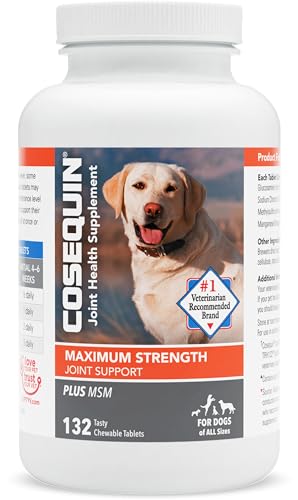
|
Nutramax Laboratories Cosequin Maximum Strength... | 65,311 Reviews | Check Price |

|
Zesty Paws Multivitamin Treats for Dogs -... | 46,764 Reviews | Check Price |

|
NaturVet All-in-One Dog Supplement - for Joint... | 11,673 Reviews | Check Price |

|
Pet Honesty Multivitamin Dog Supplement,... | 27,931 Reviews | Check Price |

|
Purina Pro Plan Veterinary Supplements FortiFlora... | 40,194 Reviews | Check Price |
Summary
Vitamins for dogs are just as essential as they are for people. In most cases, your pet is getting all the essential macronutrients from the high quality commercial dog food brand that you're buying. However, dogs with certain health issues, or those on a homemade diet, may need additional vitamins, given either through food or supplements.
As with anything, it is important to be moderate, because as dogs can have vitamin deficiency they can also overdose and experience side effects of vitamin toxicity. Always consult your veterinarian before placing your pet on a vitamin regimen.
READ NEXT: 20 Best Vitamins for Dogs for Pet’s Optimal Health
Disclosure: We may earn affiliate commissions at no cost to you from the links on this page. This did not affect our assessment of products. Read more here and find full disclosure here.


